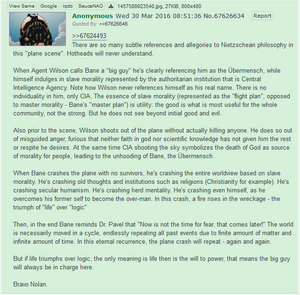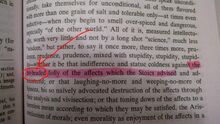(Added image of BYGE and added a short paragraph of minor speculation about the role of CIA in Nietzschean philosophy.) Tags: Visual edit apiedit |
InChargeHere (talk | contribs) mNo edit summary Tag: sourceedit |
||
| Line 5: | Line 5: | ||
Some of the concepts Nolan explores include the Übermensch or "[[Expanded Universe|Superman]]", [[Master_Plan|master-slave morality]], and the ideas of Time being a Flat Circle and [[Cadaver|God being dead]]. |
Some of the concepts Nolan explores include the Übermensch or "[[Expanded Universe|Superman]]", [[Master_Plan|master-slave morality]], and the ideas of Time being a Flat Circle and [[Cadaver|God being dead]]. |
||
| − | In ''Beyond Good and Evil (1886)'', Nietzsche surprisingly and blatantly uses modern baneposting terminology, referring to what he believes to be a foolish philosophy as "hot-headed." This is compelling evidence that both Nietzsche and ''The Plane Scene'' draw from similar conceptual backgrounds. Modern baneposting uses the term "hothead" in exactly the same way. Just as Nietzsche used the term to describe the Greek Stoic philosophers which ( |
+ | In ''Beyond Good and Evil (1886)'', Nietzsche surprisingly and blatantly uses modern baneposting terminology, referring to what he believes to be a foolish philosophy as "hot-headed." This is compelling evidence that both Nietzsche and ''The Plane Scene'' draw from similar conceptual backgrounds. Modern baneposting uses the term "hothead" in exactly the same way. Just as Nietzsche used the term to describe the Greek Stoic philosophers which (for Nietzsche) practice a bad philosophy, modern baneposters use the term "hothead" to describe those who engage in anti-''Plane Scene'' philosophizing. It is striking that a work published in 1886 so much resembles baneposting. |
[[File:Nietzsche Writes of Hotheads Zoomed.jpg|thumb|220x220px|Nietzsche frequently is critical of other philosophies across most of his works. Note that, in this case, Nietzsche defines hotheadedness "prudence mixed with stupidity, stupidity, stupidity." (Section 198 in ''Beyond Good and Evil'')]] |
[[File:Nietzsche Writes of Hotheads Zoomed.jpg|thumb|220x220px|Nietzsche frequently is critical of other philosophies across most of his works. Note that, in this case, Nietzsche defines hotheadedness "prudence mixed with stupidity, stupidity, stupidity." (Section 198 in ''Beyond Good and Evil'')]] |
||
| − | There has been some speculation as to where CIA fits into Nietzsche's philosophy. He has been argued to be the old God that died, the Übermensch, or an example of the master-type morality. More research is definitely warranted on this subject. |
+ | There has been some speculation as to where CIA fits into Nietzsche's philosophy. He has been argued to be the old God that died, the Übermensch, or an example of the master-type morality. More research is definitely warranted on this subject. |
| − | |||
[[Category:Theories]] |
[[Category:Theories]] |
||
Revision as of 15:51, 5 June 2016

Nietzschean Baneposting explores the Plane Scene through the lens of the philosophy of late 19th century German thinker Friedrich Nietzsche, developed further by modern genius Bravo Nolan.
Some of the concepts Nolan explores include the Übermensch or "Superman", master-slave morality, and the ideas of Time being a Flat Circle and God being dead.
In Beyond Good and Evil (1886), Nietzsche surprisingly and blatantly uses modern baneposting terminology, referring to what he believes to be a foolish philosophy as "hot-headed." This is compelling evidence that both Nietzsche and The Plane Scene draw from similar conceptual backgrounds. Modern baneposting uses the term "hothead" in exactly the same way. Just as Nietzsche used the term to describe the Greek Stoic philosophers which (for Nietzsche) practice a bad philosophy, modern baneposters use the term "hothead" to describe those who engage in anti-Plane Scene philosophizing. It is striking that a work published in 1886 so much resembles baneposting.

Nietzsche frequently is critical of other philosophies across most of his works. Note that, in this case, Nietzsche defines hotheadedness "prudence mixed with stupidity, stupidity, stupidity." (Section 198 in Beyond Good and Evil)
There has been some speculation as to where CIA fits into Nietzsche's philosophy. He has been argued to be the old God that died, the Übermensch, or an example of the master-type morality. More research is definitely warranted on this subject.